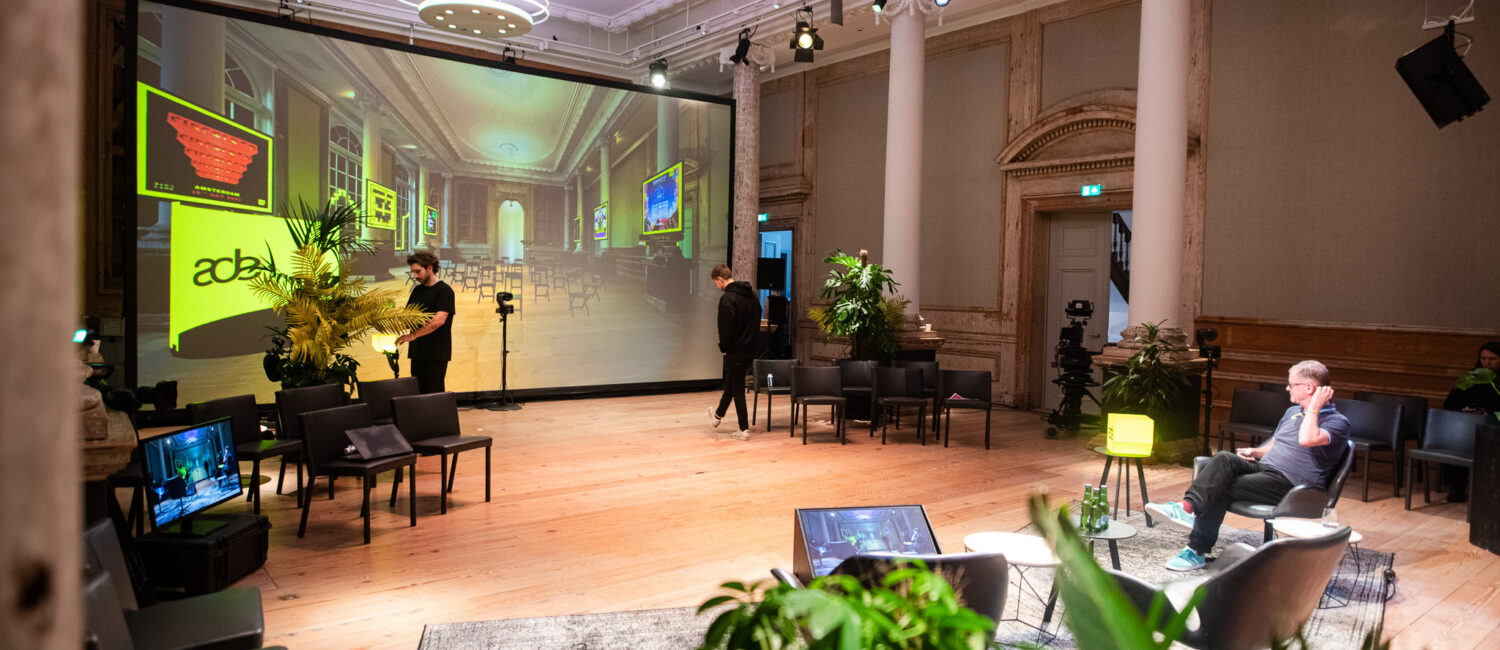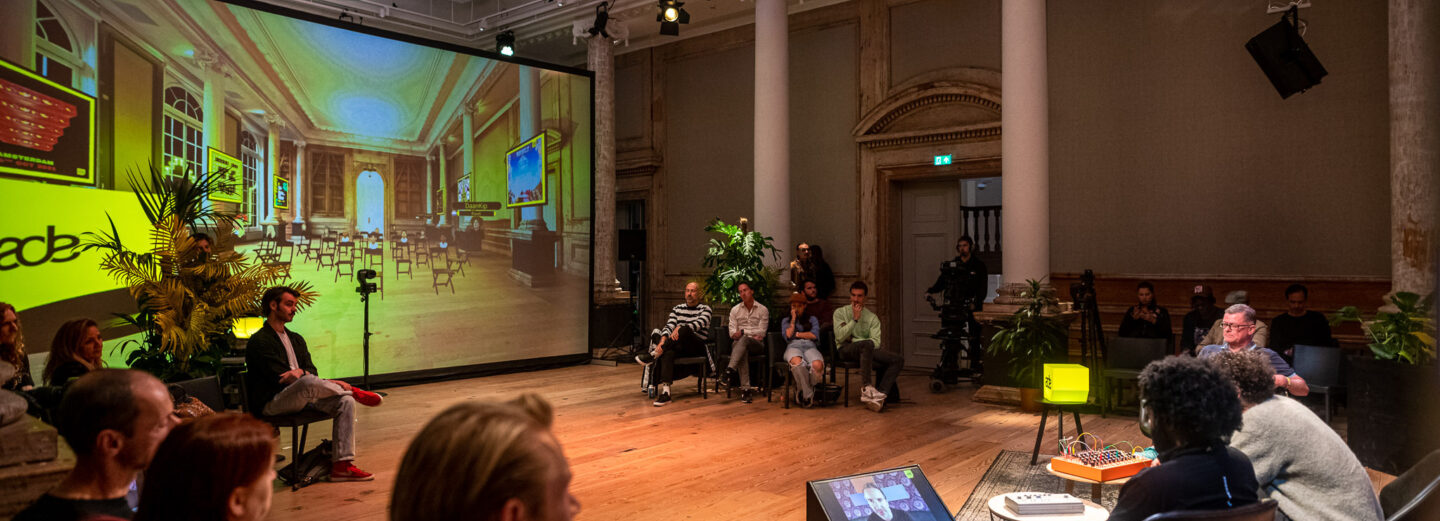
ADE in Conversation Special: The future of innovations in music and its industry
As combining the two worlds played out in real time, guests in the physical room got a glimpse of how the Metaverse added an extra dimension to real life. Members of our virtual audience were present and visible in the studio as avatars, able to participate by asking questions or chatting with other guests. In this longread, we'll share the key takeaways from brain-picking our guests on how they see the future of music innovation.
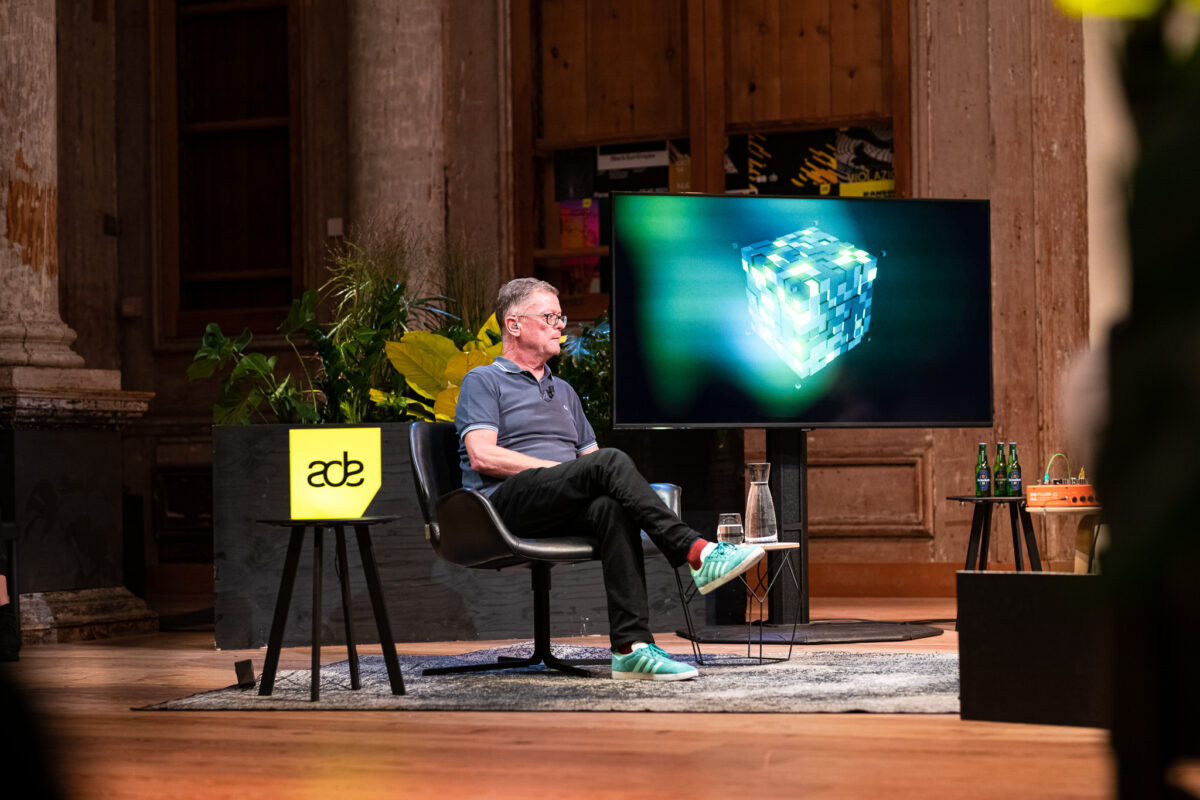
One of these visionaries is young but seasoned musical virtuoso Colin Benders; in his own words ‘riding the wave of his modular synth.’ Benders was invited to talk about music innovation, unlimited creativity, and how he achieves that with modular synthesizers. As he puts it, the modular synth sets out to be an entire new, open-ended instrument. He elaborates on his love for this workflow: ‘I can pick effects, filters, sounds and pitches, that would normally fill up an entire warehouse if they were coming from separate instruments’.
Do It Yourself
‘The open-ended nature of modular feels like the difference between playing with Lego or playing with Playmobil. On one end, everything is already pre-constructed, and on one end you’re building everything yourself. That part sucked me in and kind of became an obsession’. Host Gary Smith summarizes: ‘So basically, modular means you can take elements and put them together as a machine that suits your purposes’.
Looking at the future, Colin believes that since this past year of living with Covid-19, people have started opening up to the full potential of the possibilities of cross-reality spaces and streaming. Members of his online community are in close contact with each other, leading to collaborations with other members, as with Colin himself, driven by a passion for the instrument. ‘I’ve come to realize that there’s a passion for everything, especially in these cross-hybrid communities like mine. Luckily, now is a time when there are the means and the tools to validate people’s hobbies’, he beams with pride.
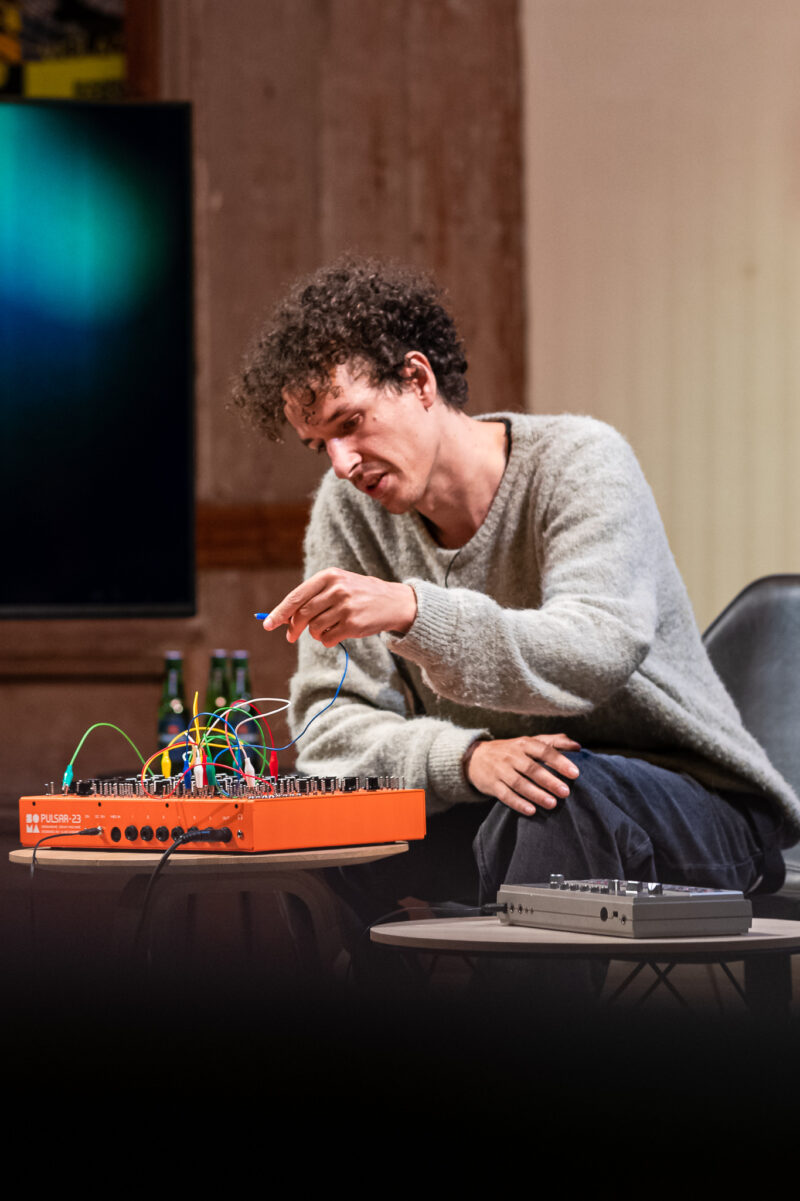
One of these visionaries is young but seasoned musical virtuoso Colin Benders; in his own words ‘riding the wave of his modular synth.’ Benders was invited to talk about music innovation, unlimited creativity, and how he achieves that with modular synthesizers. As he puts it, the modular synth sets out to be an entire new, open-ended instrument. He elaborates on his love for this workflow: ‘I can pick effects, filters, sounds and pitches, that would normally fill up an entire warehouse if they were coming from separate instruments’.
Do It Yourself
‘The open-ended nature of modular feels like the difference between playing with Lego or playing with Playmobil. On one end, everything is already pre-constructed, and on one end you’re building everything yourself. That part sucked me in and kind of became an obsession’. Host Gary Smith summarizes: ‘So basically, modular means you can take elements and put them together as a machine that suits your purposes’.
Looking at the future, Colin believes that since this past year of living with Covid-19, people have started opening up to the full potential of the possibilities of cross-reality spaces and streaming. Members of his online community are in close contact with each other, leading to collaborations with other members, as with Colin himself, driven by a passion for the instrument. ‘I’ve come to realize that there’s a passion for everything, especially in these cross-hybrid communities like mine. Luckily, now is a time when there are the means and the tools to validate people’s hobbies’, he beams with pride.
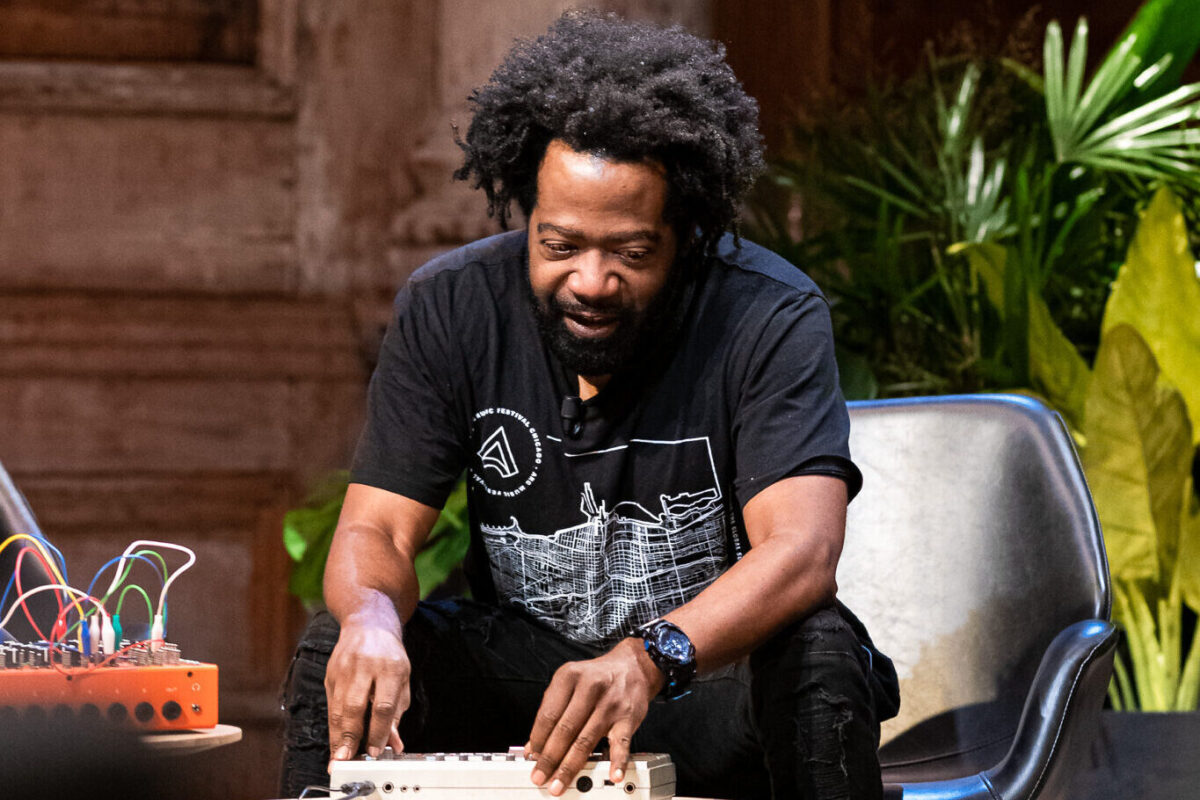
The invention of Acid House
Another visionary of his time is DJ Pierre, who joined Colin in the studio. As a member of DJ collective Phuture, DJ Pierre is one of the founding fathers of Acid House, coming from Chicago in the late ‘80’s. The sound was created on a Roland TB-303, that was present in the physical studio as well. ‘We were the new generation coming up. Disco and its scene went underground, with a lot of clubs closing. At the same time, drum machines were coming up. It was the perfect situation for something new.’
Gary adds: ‘Roland had the genius idea of creating another drum machine: a bass machine, one that was infamous for being incredibly difficult to program. How did you master this?’, he asks Pierre. ‘I didn’t’, he replies. ‘I probably just learned to misuse it. There was no manual with this machine, I was just twisting the knobs, which made it sound really fun and interesting. I already was like that as a kid; a curious person’.
‘So, the creation of Acid House was a happy accident?’
Colin answers: ‘I think it’s no longer a matter of accidents, making music this way is more of an adventure now.’ Pierre agrees: ‘The creation of acid meant that there were no boundaries anymore. See where your mind can go and flow with it. If it sounds good, it is good. After acid came up, they started making keyboards where you could twist knobs, which they never did before. Before that, they would just deliver it with a few set options on it.’
These days, Acid represents a large subgenre and community in electronic music. Did Pierre see this coming? ‘Did we think house music was going to be loved? Every five years, we get the memo that house music will die. It never does’, Pierre ponders. ‘It’s funny knowing how people grow up with the internet nowadays, and how they’re able to experience everything that happens at the same time, all around the world. Whereas before, you could totally miss something, and it was history before you even knew about it.'
A question asked by one of the people present as avatar, journalist Bambi Bogert, reaches the studio: ‘Pierre, you’ve been around for a while. There seems to be a gap between the first generation of house music aficionados and this new generation. How do you see this developing in the future?’ DJ Pierre: ‘There seems to be a gap, but the technology is the leading point in the middle. Those of us that love seeing what technology can do, will be connected. I think joining together on technology will bring us together quicker than just focussing on the sound of the music.’
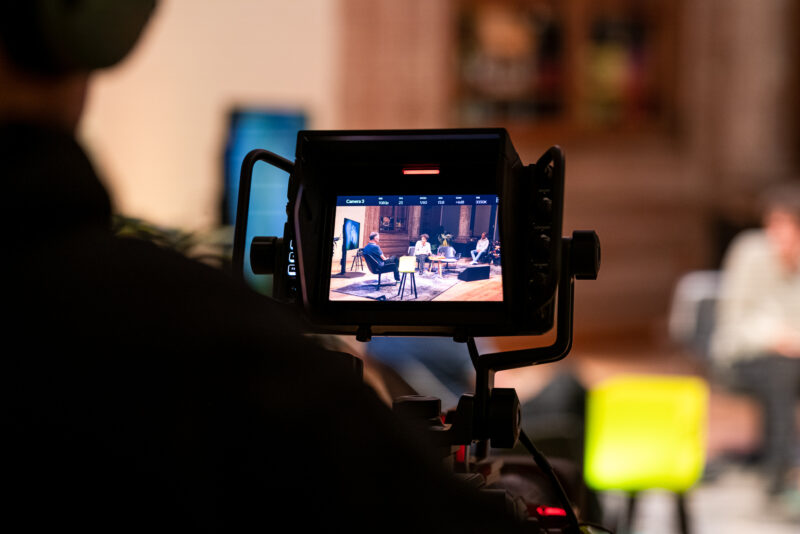
The invention of Acid House
Another visionary of his time is DJ Pierre, who joined Colin in the studio. As a member of DJ collective Phuture, DJ Pierre is one of the founding fathers of Acid House, coming from Chicago in the late ‘80’s. The sound was created on a Roland TB-303, that was present in the physical studio as well. ‘We were the new generation coming up. Disco and its scene went underground, with a lot of clubs closing. At the same time, drum machines were coming up. It was the perfect situation for something new.’
Gary adds: ‘Roland had the genius idea of creating another drum machine: a bass machine, one that was infamous for being incredibly difficult to program. How did you master this?’, he asks Pierre. ‘I didn’t’, he replies. ‘I probably just learned to misuse it. There was no manual with this machine, I was just twisting the knobs, which made it sound really fun and interesting. I already was like that as a kid; a curious person’.
‘So, the creation of Acid House was a happy accident?’
Colin answers: ‘I think it’s no longer a matter of accidents, making music this way is more of an adventure now.’ Pierre agrees: ‘The creation of acid meant that there were no boundaries anymore. See where your mind can go and flow with it. If it sounds good, it is good. After acid came up, they started making keyboards where you could twist knobs, which they never did before. Before that, they would just deliver it with a few set options on it.’
These days, Acid represents a large subgenre and community in electronic music. Did Pierre see this coming? ‘Did we think house music was going to be loved? Every five years, we get the memo that house music will die. It never does’, Pierre ponders. ‘It’s funny knowing how people grow up with the internet nowadays, and how they’re able to experience everything that happens at the same time, all around the world. Whereas before, you could totally miss something, and it was history before you even knew about it.'
A question asked by one of the people present as avatar, journalist Bambi Bogert, reaches the studio: ‘Pierre, you’ve been around for a while. There seems to be a gap between the first generation of house music aficionados and this new generation. How do you see this developing in the future?’ DJ Pierre: ‘There seems to be a gap, but the technology is the leading point in the middle. Those of us that love seeing what technology can do, will be connected. I think joining together on technology will bring us together quicker than just focussing on the sound of the music.’
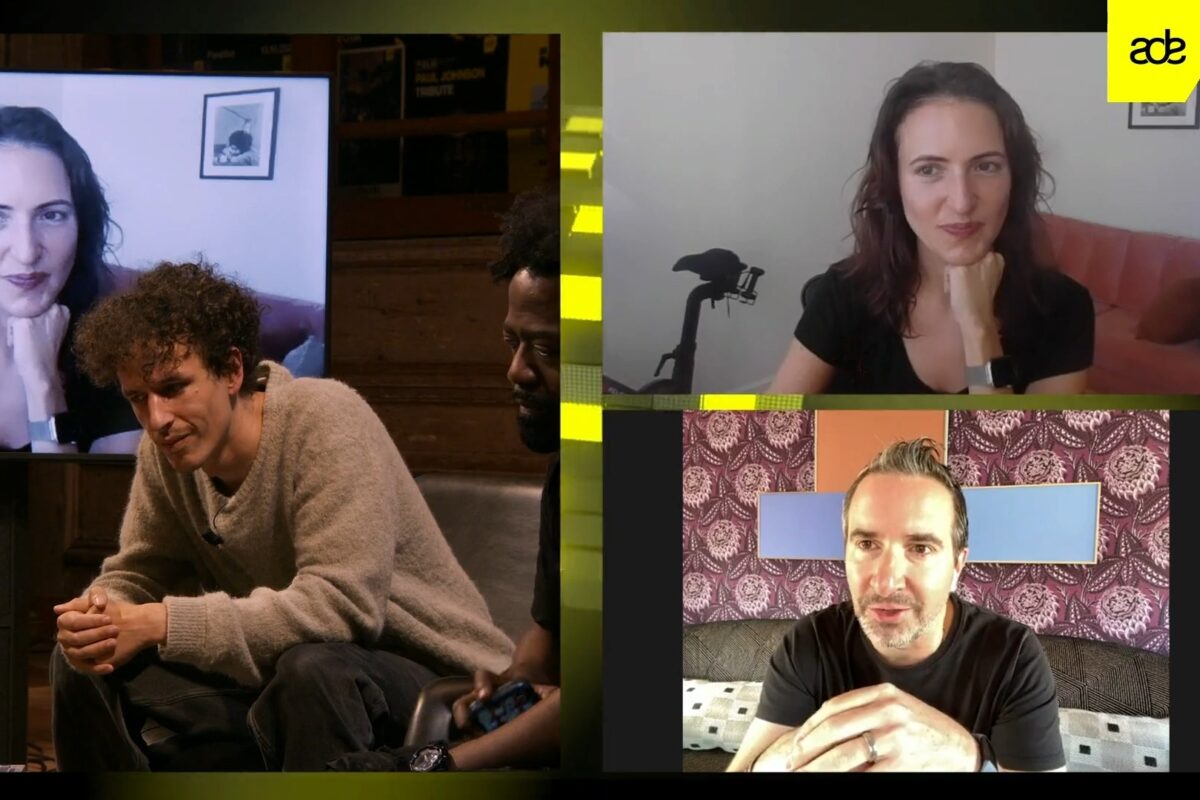
It’s nearly impossible to imagine living in a world without the internet and the treasure cove of digital innovation that precedes us. The second segment of our ADE in Conversation special focused on mixed reality, bringing together the physical and the digital world in entirely new ways. Especially in the future of live music entertainment, the converging of these two worlds will inevitably become ever more relevant.
To understand the concept of mixing reality and the experiment that this edition of ADE in Conversation entails, we need to lay the groundworks of the Metaverse. As explained by one of our guests, Oana Ruxandra, Chief Digital Officer at Warner Music Group: ‘The Metaverse is a hyperreal reality that melts digital and physical together in a live, interactive, and social way. It enables communities to generate content and experiences together and has a full functioning economic ecosystem of its own.’ Jonathan Vlassopulos, Global Head of Music at Roblox, joins the conversation as well, adding: ‘It’s a parallel experience to real life and not dependant on one specific device, such as VR or AR. Those are mediums to being present in the Metaverse, but they’re devices as opposed to being a platform.’
A world connected
On the subject of how this relates to the innovation of music, Oana adds that Warner works to build new opportunities for artists to engage with their fans. ‘The Metaverse enables artists to dream big and engage with fans in a way they could never in the real world, by sharing unique one-time experiences.’ Jonathan gives a few examples of how this is done: ‘Where a showcase would normally be visited by a 150 people, now, millions of people can tune in on a regular Friday afternoon. Moving forward, we’re expecting a more permanent presence of people's favourite artists in the Metaverse. Think amazing intergalactic, online club experiences for example.’
Colin sees the benefit of this as well, as he thinks that concerts and live events have been very region blocked so far. ‘Now, I can step into my studio, and people from all over the world can tap in at the same time, from the most remote locations possible. Instead of playing the same music over and over again in a different location on tour, I can go on an adventure with them and create something new together.’
Moderator of the virtual room, Daan Kip of The New Base, adds that technology can accelerate creativity in many ways. For example, including the audience in the making process, which is called User-generated content. As host of the avatars, he adds: ‘I see that while technology advances, the worlds of music and entertainment are becoming more content-driven, and it’s up to the makers and musicians to create beautiful content and experiences. It’s not just about the technology, it’s that you can share what you do with it’, he concludes, rounding up the experience of our own Metaverse.
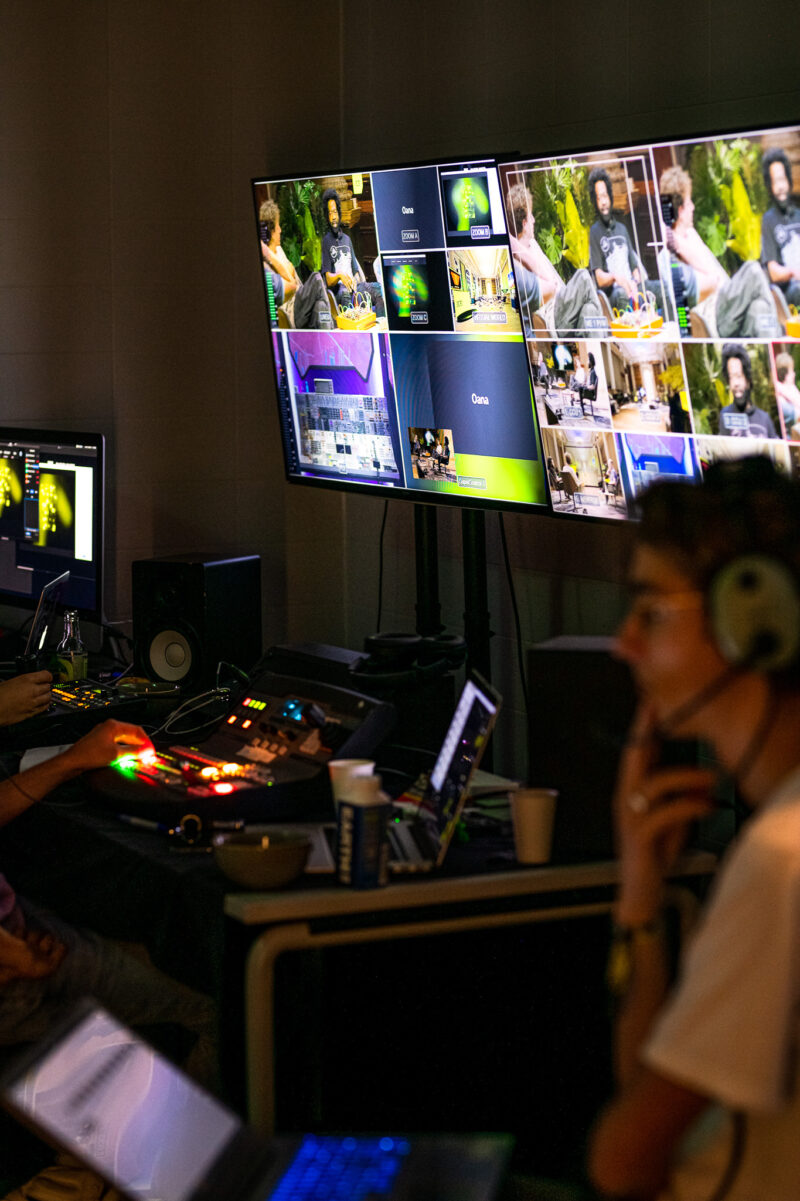
It’s nearly impossible to imagine living in a world without the internet and the treasure cove of digital innovation that precedes us. The second segment of our ADE in Conversation special focused on mixed reality, bringing together the physical and the digital world in entirely new ways. Especially in the future of live music entertainment, the converging of these two worlds will inevitably become ever more relevant.
To understand the concept of mixing reality and the experiment that this edition of ADE in Conversation entails, we need to lay the groundworks of the Metaverse. As explained by one of our guests, Oana Ruxandra, Chief Digital Officer at Warner Music Group: ‘The Metaverse is a hyperreal reality that melts digital and physical together in a live, interactive, and social way. It enables communities to generate content and experiences together and has a full functioning economic ecosystem of its own.’ Jonathan Vlassopulos, Global Head of Music at Roblox, joins the conversation as well, adding: ‘It’s a parallel experience to real life and not dependant on one specific device, such as VR or AR. Those are mediums to being present in the Metaverse, but they’re devices as opposed to being a platform.’
A world connected
On the subject of how this relates to the innovation of music, Oana adds that Warner works to build new opportunities for artists to engage with their fans. ‘The Metaverse enables artists to dream big and engage with fans in a way they could never in the real world, by sharing unique one-time experiences.’ Jonathan gives a few examples of how this is done: ‘Where a showcase would normally be visited by a 150 people, now, millions of people can tune in on a regular Friday afternoon. Moving forward, we’re expecting a more permanent presence of people's favourite artists in the Metaverse. Think amazing intergalactic, online club experiences for example.’
Colin sees the benefit of this as well, as he thinks that concerts and live events have been very region blocked so far. ‘Now, I can step into my studio, and people from all over the world can tap in at the same time, from the most remote locations possible. Instead of playing the same music over and over again in a different location on tour, I can go on an adventure with them and create something new together.’
Moderator of the virtual room, Daan Kip of The New Base, adds that technology can accelerate creativity in many ways. For example, including the audience in the making process, which is called User-generated content. As host of the avatars, he adds: ‘I see that while technology advances, the worlds of music and entertainment are becoming more content-driven, and it’s up to the makers and musicians to create beautiful content and experiences. It’s not just about the technology, it’s that you can share what you do with it’, he concludes, rounding up the experience of our own Metaverse.
Curious about the many other insights, observations and ideas discussed by our guests? Rewatch ADE in Conversation | Special Edition in full below:
